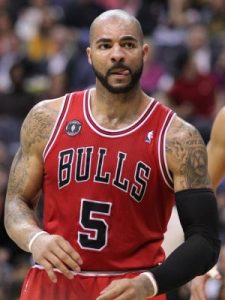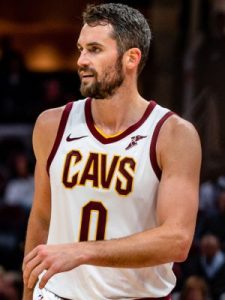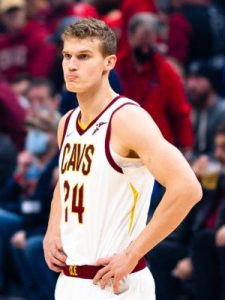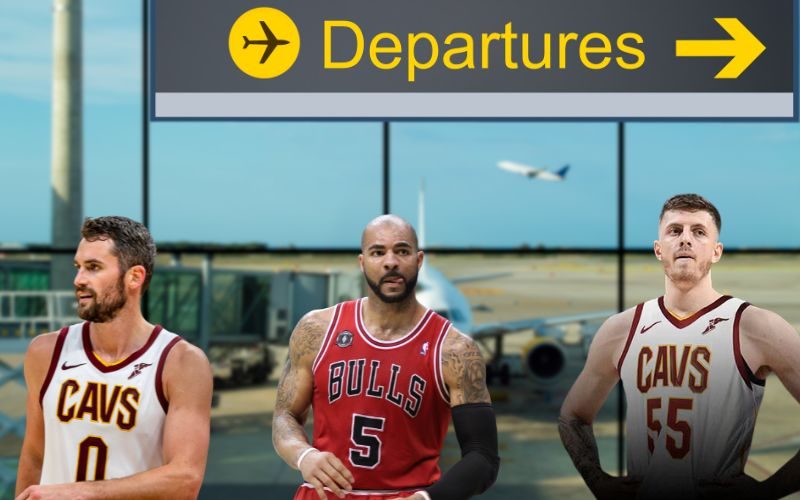Five former Cavaliers who left too soon
For any NBA fan, few things in life are as soul-crushing as watching your favorite team get taken to the woodshed by a guy who used to play for said team.
It’s especially maddening when you’re rooting for a small-market team like the Cavs, who are just a puzzle piece or two away from contending for an NBA title.
After flirting with the No. 2 seed in the Eastern Conference for a week or so last season, the Cavaliers finished in the No. 4 spot, good enough for home-court advantage in the first round of the playoffs. They were able to grind out a first-round-series win over Orlando. But with Donovan Mitchell banged up and Jarrett Allen on the bench nursing a rib injury, the Cavs just couldn’t hang with the Celtics in the semifinals.
I don’t know about you, but in those moments when the Cavaliers seem to be outmanned by a bigger, faster, stronger or more skilled opponent, I can’t help but wonder what things would be like if [insert name of former Cavs player here] wouldn’t have slipped through our fingers.
Yep, I’m talking about the ones that got away.
As one definition from urban dictionary puts it, the one that got away is that guy “you could have had it all with.” But, alas, “something – whether it was distance or just bad timing – drove you apart and left you wondering, ‘What if?’”.
What if.
Fans, sportswriters and pundits play the what-if game all the time, and speaking from experience, it’s a rabbit hole that goes absolutely nowhere. It’s a road whose inevitable terminus is grief, longing and utter despair.
So let’s go there, shall we?
Here are five former Cleveland Cavaliers who slipped away, for whatever reason. Bad timing, perhaps. Or maybe they were ensnared in a convoluted multi-team trade. Or (in one case), the Cavs just let them walk away.
5. Carlos Boozer
I’m thinking of that scene in “Godfather II,” at the New Year’s Eve gala in Havana. “I know it was you [Carlos]. You broke my heart. You broke my heart.”
In his second season out of Duke, Boozer was starting to come into his own as a profusely sweating, hard-working power forward who made his living in the low post. During that 2003-2004 season – LeBron’s rookie season with the Cavs – Boozer averaged 15.5 points and 11.4 rebounds a game. Although that was just about the high-water mark for rebounds in his career, his scoring average went up when he bolted for Utah.
About that.
After the ’03-’04 season, Boozer was a rising star on the Cavs, and the team wanted to retain him. He was on a second-round rookie contract, which paid him significantly less than his market value. The Cavaliers had an option to keep him on that low-paying contract for another year, but the front office reportedly reached a verbal agreement with Boozer and his agent. The understanding was that the Cavs would not exercise that option, making the sweaty power forward a restricted free agent. In return, Boozer would sign a six-year deal worth around $39 million, keeping him in Cleveland.

Yeah, that didn’t happen.
After the Cavs declined the team option, Boozer received an offer he couldn’t refuse from the Utah Jazz: a six-year, $70 million contract. So much for all that “my word is stronger than oak” stuff.
The Cavs really never replaced Boozer after he dropped them like a bad habit. Drew Gooden was a poor-man’s Boozer, and Tristan Thompson was Carlos Boozer Lite – all of the rebounding without the high-calorie scoring. (Neither of them was as profoundly sweaty as Boozer, I’ll tell you that much.)
It’s hard not to wonder “what if” when you consider that LeBron just got bigger, stronger and more dominant in each subsequent season after Boozer left Cleveland. LeBron and Carlos had all the makings of a dynamic duo – a force to be reckoned with in the low post. But alas, we’ll never know.
If there’s a lesson to be learned by the Cavs, it’s this one: If you really like a player, and you want that player to stay in Cleveland, you gotta lock that shit down.
4. Kevin Love
Kevin Love was the closest thing the Cavs had to Carlos Boozer in either of the Lebron eras. In his prime with Minnesota, K-Love was a double-double machine, averaging 26 points a game in two of his six seasons, and 20 points/15 rebounds a game during the 2010-2011 season. But unlike Boozer, Love was a threat from beyond the arc as well, averaging nearly 42% from 3-point range twice in his career (once as a Cav).
K-Love was a fan favorite in Cleveland, playing a memorable role in sealing the win for the Cavs in Game 7 of the 2016 NBA Finals. He was a two-time All-Star with the Cavaliers, and was a bridge from LeBron’s second tour of duty to the renaissance of the franchise that we’ve enjoyed these past few seasons. However, in his first season playing alongside Donovan Mitchell, Love was in a funk. The UCLA alum missed some time due to a thumb injury, and his 3-point shot wasn’t the same when he returned. By February 2023, Love had fallen out of J.B. Bickerstaff’s rotation, and when he did see playing time, his 3-point shots just weren’t falling.

Reportedly unhappy with his limited role, Love and the Cavaliers mutually agreed to a buyout of the remainder of his contract, which had been set to expire at the end of the season. The front office allowed him to pursue opportunities with other teams – giving him the chance to potentially play for a playoff contender. So, the Cavs got absolutely nothing in return.
After the buyout, Love quickly signed with the Miami Heat, where he played a key role in their march to the 2023 NBA Finals.
Love’s career appears to be winding down, but he still has some value as a sixth man when he’s fully healthy. Even though his 3-point shooting has been a bit shaky, he’s still good for half a dozen rebounds in 20 minutes of game action, and his outlet passes are truly elite. (That might be the aspect of his game I miss most.)
While the Heat made it to the NBA Finals in 2023, the Cavs got spanked by the Knicks in a gentlemen’s sweep. The Cavs’ ignominious exit from the playoffs was a trigger for all kinds of what-if statements (like, “What if J.B. Bickerstaff wasn’t the head coach?”).
It also made me wonder if the Cavs should’ve been more patient with Love. Let’s be clear: Having K-Love around for the rest of the ’22-’23 season wouldn’t have been enough to flip the script against the Knicks. But his veteran presence and playoff experience were sorely needed in a series where the lights were too bright for many of the young players.
3. Isaiah Hartenstein
Heading into the third year of the Donovan Mitchell Experience, Isaiah Hartenstein could very well be first on my list of the ones that got away.
Let me take you back to 2020-2021 – the post-LeBron, pre-Evan Mobley, pre-Donovan Mitchell era – when Isaiah Hartenstein had a cup of coffee with the Cavs (who were not so great that year). The Cavaliers landed the 7-foot freight train (and two second-round draft picks) in a trade with Denver for veteran JaVale McGee. According to an article on Cleveland.com, Hartenstein had been on the Cavs’ radar ever since Assistant GM Mike Gansey saw him playing internationally at Basketball Without Borders in 2016.
The 2020-2021 season was a time of transition for the Cavaliers (and a strange time for all of us). The Cavs were eyeing USC big man Evan Mobley in the upcoming draft, and in late August, they acquired 7-footer Lauri Markannen from Chicago in a three-team deal. Hartenstein saw the writing on the wall, and opted out of his contract, ultimately landing with the L.A. Clippers.
Hartenstein’s versatility as a passer, shot blocker and energy player off the bench made him a key rotational piece for the Clippers during the 2021-2022 season, and his performance helped him secure a multi-year contract with the New York Knicks after the season.
Hartenstein was a perfect fit for the scrappy Knicks and Tom Thibodeau’s hard-nosed, gritty style of basketball. He seemed to relish pushing the Cavs’ frontcourt around, especially in the 2023 playoffs. I was shocked that the Knicks let Oklahoma City snag him this summer. Tough, defensive-minded backup centers aren’t exactly a dime a dozen.
If there is one silver lining, at least Hartenstein doesn’t play in the Eastern Conference anymore.
2. LeBron James
Perhaps you’ve heard of this guy. The Cavaliers drafted LeBron with the first pick in the 2003 draft, and in short order, the Chosen One had the franchise on a path to the promised land. And then, seemingly in the blink of an eye, he took his talents to South Beach, where LeBron and his pals won two NBA titles.
If LeBron wouldn’t have led the Cavaliers to an NBA title in 2016, this is a much different conversation. LeBron earned three NBA rings with teams other than the Cavs, but the fact that he delivered Cleveland’s first major sports championship since 1964 helps salve a lot of the pain of losing LBJ not once but twice.
So where does that leave us? Well, after surviving the second post-LeBron hangover, the franchise seems like it’s in a good place. And I certainly don’t miss LeBron-style basketball: four guys standing around the perimeter watching LeBron dribble and/or post-up . Nor do I miss the nonstop LeBron drama mill (“Will he stay? Will he go? Does he like the coach? Is he happy with the roster?”). For the most part, the current crop of young talent has been a joy to watch.
Does that mean I’ve never entertained a fantasy where LeBron comes back to Cleveland to finish his career (for the veteran’s minimum) and flourishes as the ultimate sixth man, delivering a second NBA title to the franchise? And despite publicly stating his intentions to retire, comes back the next season and helps the Cavs win a third NBA championship? Well I can dream, right?
1. Lauri Markkanen
And finally, we have the curious case of Lauri Markannen. After drafting Evan Mobley with the third overall pick in the 2021 NBA draft, the Cavaliers decided to go big or go home –quite literally – acquiring Markannen from Central Division rival Chicago as part of a three-team trade in August 2021.

One of three tall trees in the Cavs starting lineup, Markkanen had a solid but unremarkable season in Cleveland, averaging 14.8 points and 5.7 rebounds. After the Cavs narrowly missed the playoffs in 2022, Koby Altman and the Cavs’ front office decided to go all in on Donovan Mitchell, who was available – for a hefty ransom – from the rebuilding Utah Jazz. The Cavs sent Markkanen and a treasure trove of assets to Utah, where it looks like the talented 7-footer from Finland has found his forever home.
As the centerpeice of Utah’s offense, Markkanen has flourished. He averaged 25.6 points (a career high) and 8.6 rebounds in 2022-2023, earning Most Improved Player honors and his first All-Star selection. Markkanen struggled with injuries last season, but he still averaged 23.2 points and 8.2 rebounds, and hit nearly 40% of his 3-point attempts.
Meanwhile, back in Cleveland, Mitchell has been phenomenal. Still, when you think about the premium price that Cleveland paid to acquire the five-time All-Star, I often wonder if there was a way to get Mitchell without relinquishing Markkanen. What if the Cavs had included Darius Garland in the trade package instead?
I mean, what if?
